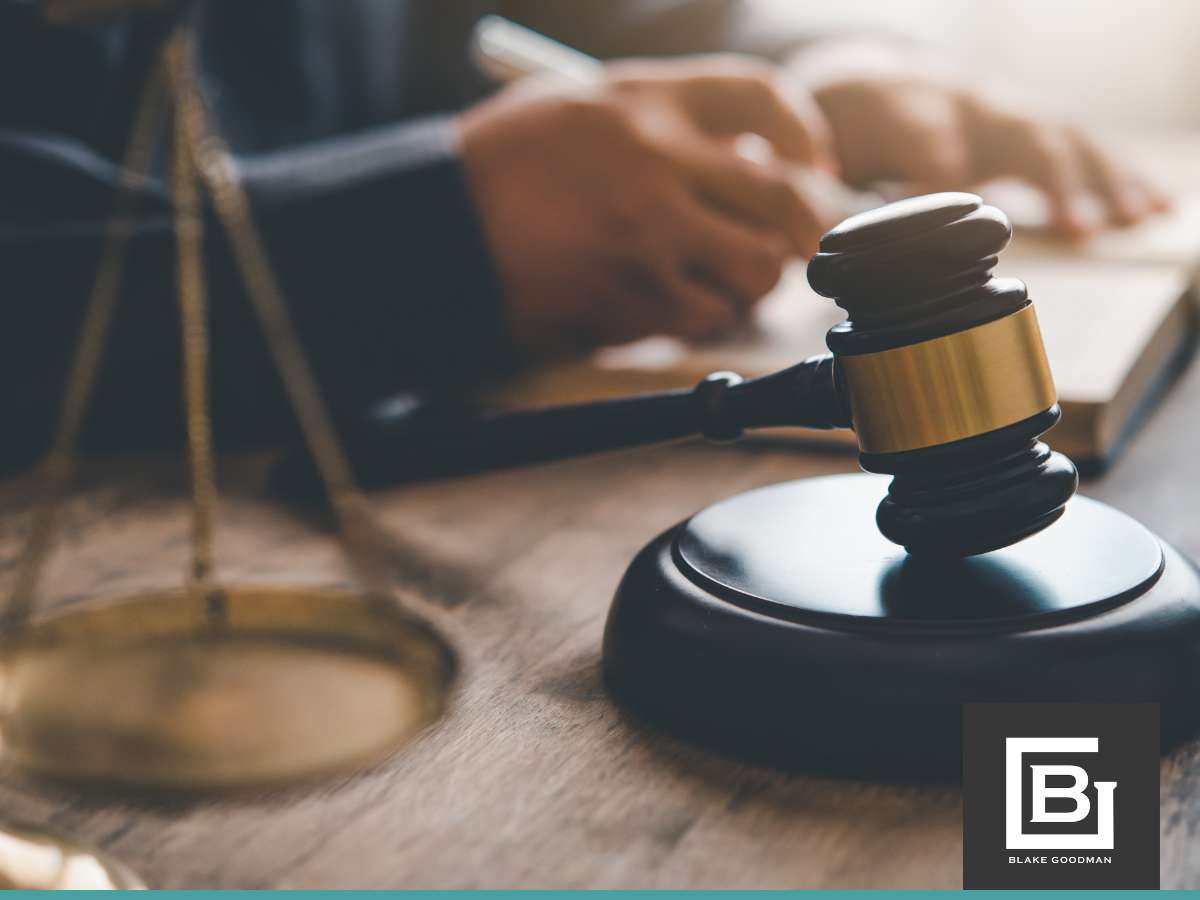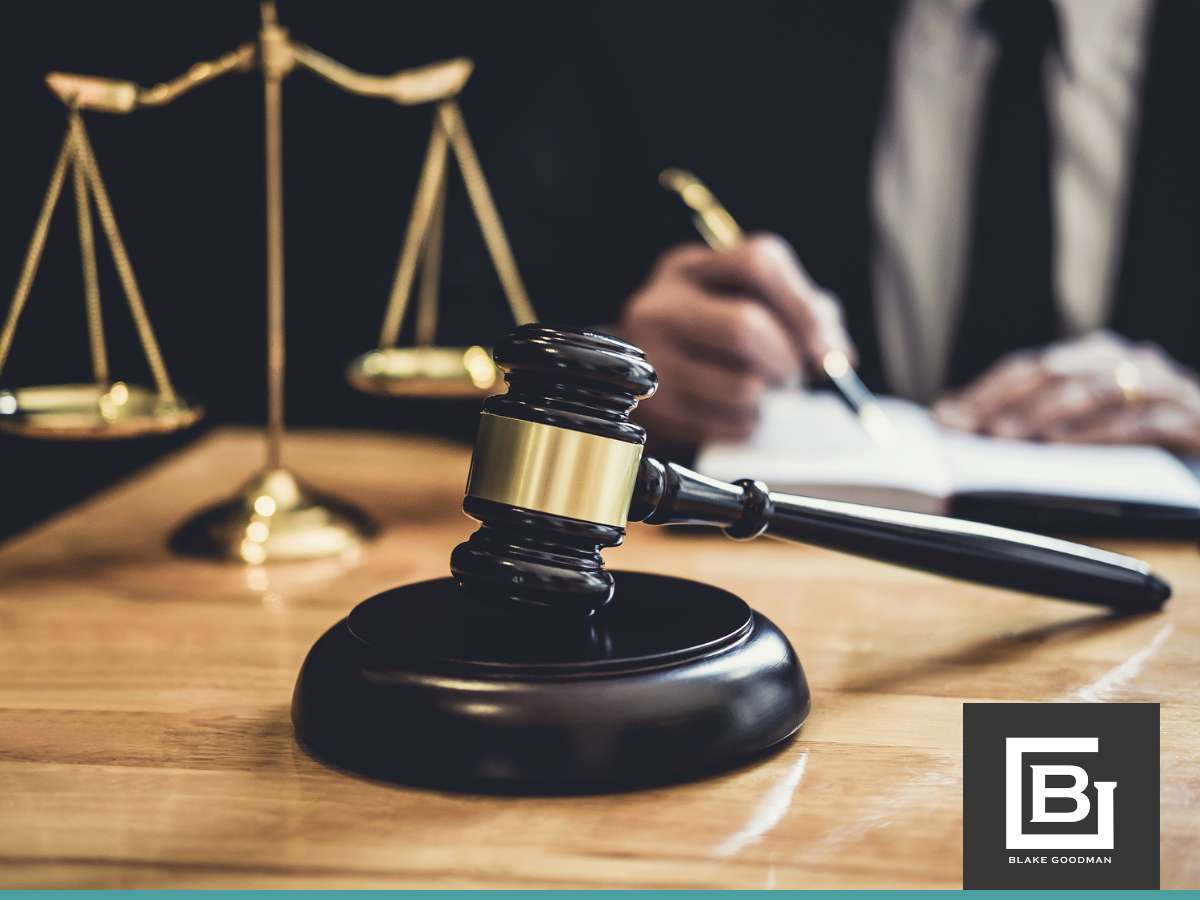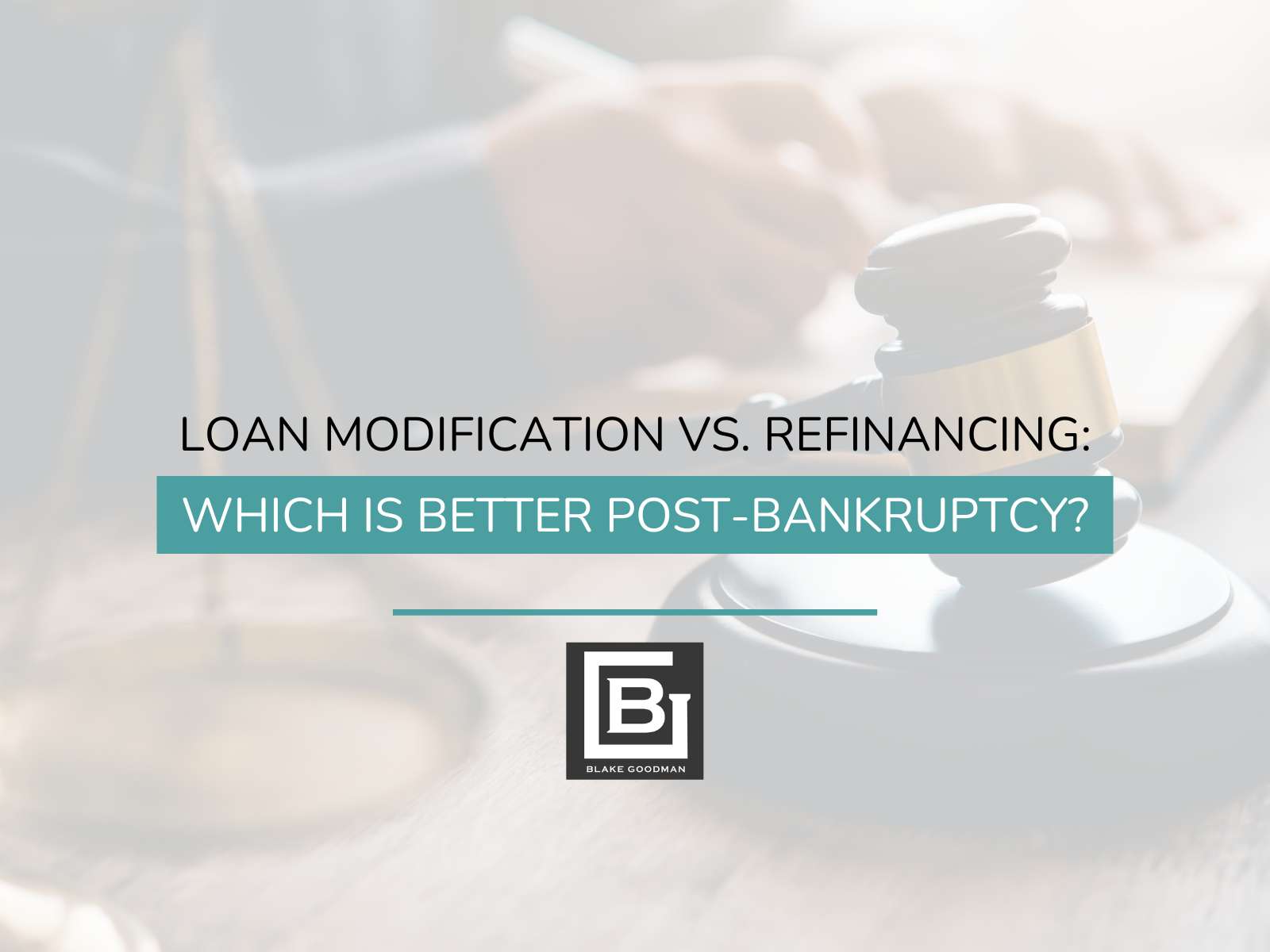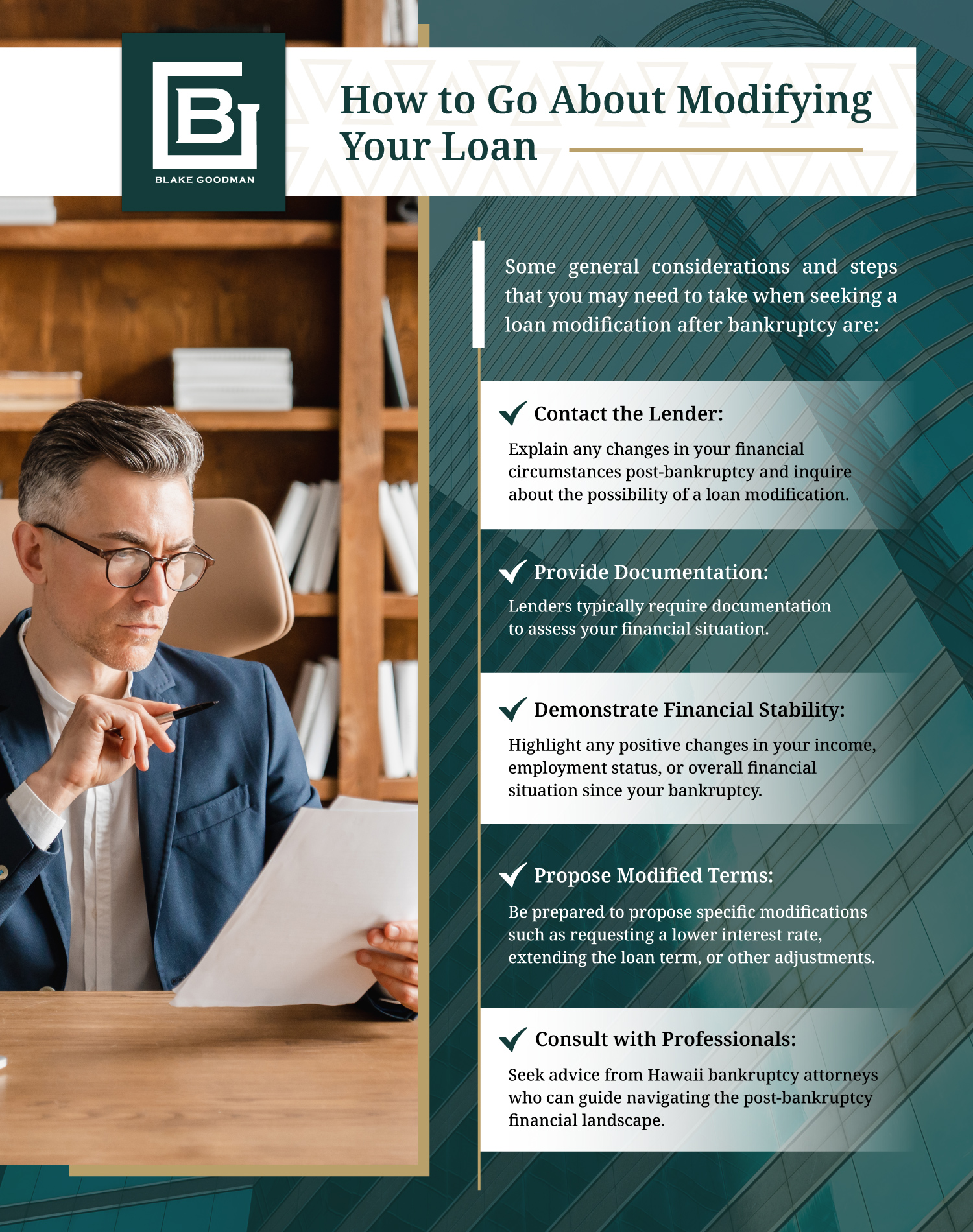Navigating Mortgage Adjustments After Bankruptcy: Refinancing Or Modification Options In Hawaii
 A loan modification adjusts the original conditions of your mortgage loan. In contrast to refinancing, a loan modification doesn’t settle your existing mortgage to start a new one.
A loan modification adjusts the original conditions of your mortgage loan. In contrast to refinancing, a loan modification doesn’t settle your existing mortgage to start a new one.
When you have finally made it past the bankruptcy process, you may be thinking of adjusting your mortgage payments. This may be a consideration because you are struggling to pay your hefty monthly payments or because interest rates are much lower than when you originally got your loan.
Before you seek foreclosure services, two options allow you to adjust your mortgage payments. First, you could consider refinancing your home and if that is not an option, loan modification is a possibility. These processes have similar results, but they are different in many ways. In this article, we’ll explore their respective advantages and disadvantages to help you determine which path might be the most beneficial for your post-bankruptcy financial situation in Hawaii.
Understanding Loan Modifications: A Path To Adjust Your Mortgage Terms Without Refinancing
Loan modifications change the terms of your original mortgage. Unlike refinancing, it does not pay off your loan and start with a new one, it simply changes the terms of what already exists.
Loan modifications are often considered as an alternative to foreclosure, as they provide a way for borrowers, including prior bankruptcy filers, to avoid defaulting on their loans and losing their homes. The downside of these modifications is that they are not readily given out by lenders and they often impact your credit score.
The Process Of Loan Modification: How It Works & When To Consider It
Getting a loan modification can be difficult as lenders are under no obligation to accept your request. Evidence of hardship is typically required and each lender has their own rules on who can qualify and how they will go about the modification. The common modifications may include:
- Interest Rate Reduction: The lender may lower the interest rate on the loan.
- Loan Term Extension: The term of the loan may be extended, meaning lower payments.
- Principal Forbearance Or Reduction: A portion of the principal amount may be temporarily deferred or permanently reduced.
- Payment Deferral: The lender may allow the borrower to defer a certain number of payments to a later date.
The specific terms of a loan modification depend on the agreement reached between you and the lender. Hawaii Bankruptcy lawyers or Hawaii foreclosure lawyers may be able to assist you in determining the best course of action after bankruptcy in your specific case.
Strategies For Modifying Your Loan In Hawaii: Steps To Take After Bankruptcy
If you have recently completed the bankruptcy process, modifying a loan may require consideration and has specific requirements. Each lender has different policies when it comes to loan modifications so it’s important to communicate with them. Some general considerations and steps that you may need to take when seeking a loan modification after bankruptcy are:
- Contact The Lender: Explain any changes in your financial circumstances post-bankruptcy and inquire about the possibility of a loan modification.
- Provide Documentation: Lenders typically require documentation to assess your financial situation. This may include proof of income, employment verification, tax returns, and a detailed budget.
- Demonstrate Financial Stability: Highlight any positive changes in your income, employment status, or overall financial situation since your bankruptcy.
- Propose Modified Terms: Be prepared to propose specific modifications such as requesting a lower interest rate, extending the loan term, or other adjustments.
- Consult With Professionals: Seek advice from Hawaii bankruptcy attorneys who can guide navigating the post-bankruptcy financial landscape, negotiating with lenders, and ensuring your rights are protected.
Refinancing Your Mortgage In Hawaii: An Overview & Benefits Post-Bankruptcy
Refinancing is paying off your current mortgage using a new loan with new terms and conditions. This option also allows you to take cash out of your home if you have enough equity. The goal of refinancing is to obtain better loan terms such as lower interest rates, which can lead to reduced monthly payments or a shorter loan term! Considering refinancing is a good idea if you want to:
- Lower Interest Rates: If interest rates have decreased since the original mortgage was obtained, refinancing can help bring your rates down.
- Reducing Monthly Payments: Reduce your monthly payments either through lower interest rates or by extending the loan term.
- Shorten Loan Term: Some homeowners refinance to move from a 30-year mortgage to a 15-year mortgage, saving money on interest payments over the life of the loan.
- Switching Loan Types: Homeowners may choose to switch from an adjustable-rate mortgage to a fixed-rate mortgage or vice versa.
- Accessing Home Equity: Cash-out refinancing allows homeowners to tap into their home equity by borrowing more than the remaining balance on the existing mortgage. The homeowner receives the difference in cash.
- Consolidating Debt: Homeowners with high-interest debt may choose to refinance and consolidate their debts into a single, lower-interest mortgage.
Effective Strategies For Successful Refinancing After Bankruptcy

Once you have a lender, gather all necessary financial documentation. You will submit these documents along with an application. You will likely need an appraisal before you can close your refinanced loan and underwriting will commence. Lastly, you will attend a closing meeting where you will sign your closing documents.
Making The Choice In Hawaii: Should You Refinance Or Modify Your Loan Post-Bankruptcy?
The decision between refinancing and loan modification after bankruptcy in Hawaii depends on your specific financial goals, circumstances, and eligibility. Both options have their pros and cons, and the choice may vary based on individual situations.
Consider consulting with a Hawaii bankruptcy attorney who will help you assess your post-bankruptcy circumstances and determine which option aligns better with your financial goals and constraints.
Consult Our Expert Bankruptcy Attorneys For Guidance On Loan Modification & Refinancing After Bankruptcy!
Consult Our Expert Bankruptcy Attorneys for Guidance on Loan Modification and Refinancing After Bankruptcy!
Navigating the aftermath of bankruptcy can be challenging, especially when it comes to mortgage adjustments. At Blake Goodman P.C., our adept Hawaii bankruptcy attorneys specialize in providing comprehensive support for individuals looking to explore their options in refinancing and loan modification. Our team is committed to understanding your unique situation and guiding you through the intricacies of mortgage-related solutions tailored to your post-bankruptcy circumstances.
Don’t let the complexities deter you from securing a stable financial future. Contact us and schedule a consultation to delve into your specific needs and discover how we can assist in optimizing your mortgage terms in alignment with your financial recovery journey. Take the first step towards regaining control of your financial health today!

Email: blake@debtfreehawaii.com
Website: https://www.debtfreehawaii.com/
HONOLULU OFFICE
900 Fort Street MallSuite 910
Honolulu, HI 96813
Phone: (808) 517-5446
AIEA OFFICE
98-1238 Ka'ahumanu StSuite 201
Pearl City, HI 96782
Phone: (808) 515-3441
KANEOHE OFFICE
46-005 Kawa StSuite 206
Kaneohe, HI 96744
Phone: (808) 515-3304
MAUI OFFICE
220 Imi Kala St. #203BWailuku, HI 96793
Phone: (808) 515-2037

Blake Goodman received his law degree from George Washington University in Washington, D.C. in 1989 and has been exclusively practicing bankruptcy-related law in Texas, New Mexico, and Hawaii ever since. In the past, Attorney Goodman also worked as a Certified Public Accountant, receiving his license form the State of Maryland in 1988.


